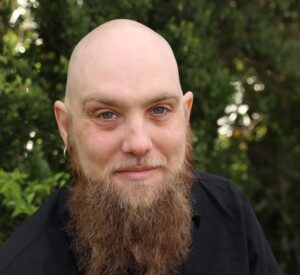Is your autistic 8-year-old still not talking? It’s natural and normal for parents to really worry if their nonverbal child will ever have conversation.
You might be wondering if eight years of age is beyond some kind of threshold after which speech, let alone conversation, can ever develop.
But there’s hope. If your autistic son or daughter still is not speaking or saying phrases at eight years of age, this doesn’t automatically, 100 percent mean that they will never be able to verbally express themselves.
Chad Osinga will certainly verify this. He’s the father of two autistic children. Below is his story.
Taylen’s Speaking Journey
At around 11 months old my son, who had been able to say a few small words like “Daddy,” stopped saying anything.
Not understanding what happened to our son, we decided to seek help from a developmental specialist who told us he had Autism.
Our son would be nonverbal for the next eight years.
Over those eight years, my wife and I tried many strategies to improve our son’s verbal capabilities.
We have done everything from extensive therapy sessions five days a week, using an iPad device to articulate himself, adaptive behavioral analysis (ABA), and reading to him daily, to name a few.
My son is now 11 years old and can hold small conversations; coming from a child who could not even say “Daddy” just three years ago is quite the victory in my eyes.

Taylen Osinga
Looking back, I believe specific things encouraged his ability to become verbal.
First, constant and consistent modeling of words. Of course, this took time, but it was our commitment to him that I believe made a massive impact.
Next, labeling everything became crucial, as remembering the names of objects is immensely tough for him.
Reading is fundamental; taking time to repeatedly go over sight words and read the same books in repetition kept our son’s working memory engaged.
Figuring out what motivates and stimulates our son kept him engrossed even though it was hard work and repetitive.
When we did this, we would also have him try and read with us; of course, it was not happening in the beginning, but over time he was able to say one word after the other.
Lastly, my wife and I decided not to place our son in a box and allow the label of Autism to define him.
I believe out of everything we did; this was the most important. It is effortless to enable a diagnosis and current struggles to affect our subconscious as parents. We must decide to believe and encourage our children never to settle.
Deep within my being, I believe what helped my son become verbal was our unwillingness to settle, and work with our son tirelessly.
Our son hated the iPad that helped him articulate words given to communicate. My son wanted to speak like everyone else around him verbally.
For quite some time, we tried to force the device, and though he learned how to use it, he applied every chance he had not to use it.
We realized that he desired to talk without assistance, and it was our task to do whatever it took to get him to that place.
Our son still has a ways to go in his communication skills, but the fact that he went from nonverbal to verbal is genuinely remarkable.
We have taught our son never to quit, to be tenacious regardless of how challenging the situation we find ourselves in may be. I believe this thought process was the defining aspect of his speaking ability.
I encourage the parents facing a similar situation with their autistic child to stay the course. Be consistent with loving, teaching and encouraging your child.
Not allowing their diagnosis to define your child; allow your hard work and consistency to speak instead.
This journey is a marathon, not a sprint; it is our job as parents to stay focused on the path leading to our precious children’s success.
Whatever that looks like for you, I implore you to stay focused and feel honored God chose you for this fantastic journey.
 Chad Osinga is a retired Army sniper and combat applications instructor, having trained the military, FBI and SWAT teams. During retirement he sustained two motorcycle accidents and had to relearn walking. His daughter had a stroke at age five. He ultimately realized that he could harness his daunting life experiences to assist others in becoming their best. Now a motivational speaker, Chad speaks nationwide at schools and detention centers. facebook.com/chad.osinga
Chad Osinga is a retired Army sniper and combat applications instructor, having trained the military, FBI and SWAT teams. During retirement he sustained two motorcycle accidents and had to relearn walking. His daughter had a stroke at age five. He ultimately realized that he could harness his daunting life experiences to assist others in becoming their best. Now a motivational speaker, Chad speaks nationwide at schools and detention centers. facebook.com/chad.osinga
.
Top image: Shutterstock/Stone36
Do Autistic People Feel Different Among Other Autistic People?
I’m Autistic, Identity First Language! I Don’t “Have Autism”
Can Autism Be Ruled Out if the Patient Has Good Eye Contact?






































